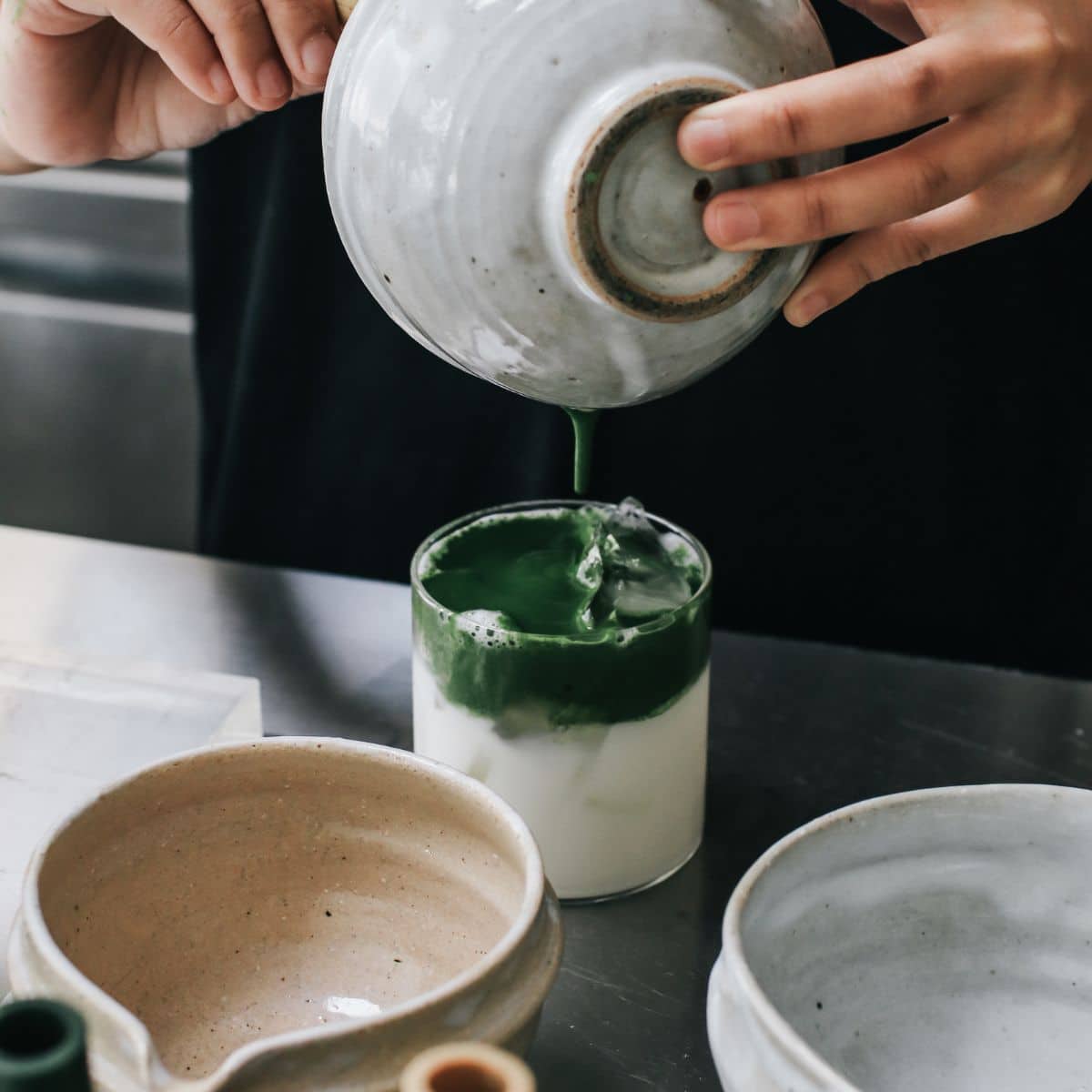

Coffee is by far the most popular beverage consumed in the early hours of the day by Americans and many others worldwide. [1] It’s also one of the most regularly consumed sources of caffeine, making it the subject of frequent health debates. Is it bad for us? Should we avoid it? And if we do, are there healthy alternatives besides water?
Coffee Benefits and Side Effects
The good news is that coffee does have numerous health benefits when consumed in moderation. It contains some of the highest levels of antioxidants of all foods and drinks commonly consumed and has been consistently linked to many health benefits.[2] These include preventing Parkinson’s disease, lowering depression rates (especially in women), and supporting liver health. It has even been shown to have cardiovascular benefits.
Unfortunately, coffee can have negative effects as well. Too much caffeine can lead to headaches, anxiety, and insomnia and poor sleep quality, which can leave you feeling so tired during the day that you drink more coffee to compensate, creating a vicious cycle of dependence and increasing fatigue. Finally, those who add sugar, dairy, or oil-based creamers to their coffee may further undermine its health benefits.[3] (Incidentally, research suggests a similar benefit-blocking effect for milk with tea, berries, and chocolate.[4]) Caffeine and sugar also have addictive properties, which tend to lead to greater consumption over time and are ultimately detrimental to your physical and mental well-being.
Finally, to throw another interesting ingredient into the brew, evidence suggests that the effects of drinking coffee might also depend on the person drinking it. This is most notably seen in blood pressure research, which has found that consuming three to five cups daily has a “neutral or even beneficial impact on blood pressure values and the new onset of hypertension” in habitual consumers; however, the same amount can cause a blood pressure rise in non-habitual consumers.[5]
These potential benefits and risks illustrate an important point: the coffee bean itself is not nearly as simple as many assume; “On average, over 1000 chemical constituents are present in coffee, and many of them are biologically active.” [5] How you choose to make sense of this complexity will depend on your personal goals, your sleep quality, and many other factors that only you can decide on.
(For more on caffeine, read Does Caffeine Have a Place in a Whole Food, Plant-Based Diet?)

3 Tips for Life without Coffee
For those who choose to limit coffee intake—perhaps they are more sensitive to caffeine than they would like to, and it’s undermining their sleep—what are the best alternatives?
Because of its addictive properties, cutting out coffee can be challenging, but don’t lose hope. If you’re trying to reduce or eliminate coffee, here are three simple strategies that might help.
1. Explore Coffee Alternatives
There are more and more caffeine-free coffee alternatives on the market every year. Common ingredients in these products are roasted barley, rye, and chicory root. These alternatives are favored for their robust coffee-like flavors and health benefits. Chicory root, for example, is naturally sweet and a great source of inulin, a soluble fiber that can help prevent diabetes, regulate digestion, and maintain beneficial gut bacteria. Note, however, that too much inulin—as with too much of any fiber—can also lead to bloating, gas, and upset digestion, so watch your intake and listen to your body. Also, remember that barley and rye contain gluten and may not suit those with gluten sensitivity.
Many people find these coffee alternatives are just what they need to kick the habit. You can find them sold under numerous brands. As always, read the ingredients list before deciding whether it’s right for you.
Another unique coffee alternative—my favorite—is roasted cocoa beans, which can be ground and brewed just like coffee. Containing almost no caffeine—even less than decaffeinated coffee—brewed cocoa beans have a wonderful flavor similar to coffee. Cocoa beans are gluten-free, and cocoa is also rich in antioxidants, delivering the health benefits of dark chocolate without the added fat or sugar. I like to mix this with my coffee, adding one scoop of each to my coffee maker, reducing my total coffee intake. The resulting beverage is like a healthier, reduced-caffeine version of a mocha.
2. Take It a Cup at a Time
For some, quitting coffee cold turkey after routinely drinking several cups per day can be too hard. It’s also often not optimal or suggested to take something out of your routine without replacing it with a better option, and caffeine withdrawal can produce unpleasant side effects. So, take it a cup at a time for optimal success.
Start by cutting your coffee to one less cup than you drink now. If you usually drink more than one cup of coffee in a row, try switching to an alternative beverage after the first cup. For many people, just having something warm to drink can solve the problem of missing coffee and curb the impulse to drink it cup after cup. When you’re ready—perhaps a week to a month later—reduce your coffee consumption by another cup and try switching to one of the tea options below.

3. Choose a Nutritious Tea Instead
Tea provides many nutritional benefits, and you can purchase countless varieties with and without caffeine.
I love matcha tea, a Japanese steamed green tea ground into a fine powder. It contains some caffeine but not as much as coffee. It is also high in chlorophyll and antioxidants and has a delicious flavor. While most tea is made by steeping the leaves in hot water, matcha tea powder is so fine that it is stirred directly into the water with a whisk. Therefore, you consume the whole leaves and get even more health benefits. Be sure to purchase a high-quality bright green matcha that is organically processed. There are numerous brands available. High-quality matcha can be expensive, though, and other green teas are still a good option if you are on a budget.
In addition to Camellia sinensis—the tea plant native to Asia and consumed worldwide—several other healthy plants are prepared similarly. One of them is yerba maté, which is native to South America. Often called maté for short, it contains considerably more caffeine than green tea—about 80 milligrams per serving versus only 35 milligrams for green tea—but that may be less caffeine than your current preferred coffee brewing method. Yerba maté is also rich in antioxidants and full of health benefits.[6] There are a few organic, Fair Trade–certified brands. Just look for the air-dried, unsmoked varieties to reduce exposure to potential toxins from smoked varieties. Yerba maté has a nutty, green, smoky flavor that is really nice. You may want to add a healthy sweetener, lemon, or plant-based milk or drink it plain. However, because it is a source of caffeine, it should not be overconsumed or relied on all day long for energy. Have a cup in the morning or early afternoon when you might have previously consumed coffee.
Finally, consider other caffeine-free teas (tisanes) like peppermint, which is calming but gently stimulating. Another variety you might enjoy is rooibos (pronounced ROY-boss) tea—also called red bush tea—which has a delicious sweet flavor with zero calories or sugar. It is also a great source of antioxidants and health-promoting compounds.[7] You might try ginger tea or other natural fruit-flavored herbal teas. All of these can be enjoyed hot or cold, depending on your preference and lifestyle needs.
Summary and Tips for Success
Quitting coffee is not easy, but doing so might provide health benefits that make it worthwhile. It can lead to better sleep, increased productivity, increased energy levels, improved mood, reduced inflammation, and less dependency on caffeine over time. You might even see benefits in your skin, digestive health, blood pressure, and more. Of course, everyone is different, and coffee can work well for some if consumed in moderation.
If you choose to stick with coffee, enjoy it black or with organic, unsweetened plant-based milk (e.g., soy, almond, or cashew milk) for optimal health benefits. Before adding anything to your coffee, look at the ingredients and ensure you are not polluting your beverage with unhealthy oils, sugars, or dairy byproducts. If you must add sweetener, use a high-quality natural sweetener like maple syrup, coconut sugar, date sugar, or organic stevia extract, and use as little as possible.
If you have successfully quit coffee or reduced your consumption, please share tips that have proven successful!
References
- Ridder M. Most popular breakfast drinks among consumers in the U.S. in 2024, by age. Statista.com. January 3, 2025. https://www.statista.com/statistics/1447304/most-popular-breakfast-drinks-among-consumers-in-the-us/
- Nordqvist J. Is coffee good for you? Health benefits, disadvantages, and more. Medical News Today. November 16, 2023. https://www.medicalnewstoday.com/articles/270202
- Greger M. Coffee benefits blocked by adding milk? NutritionFacts.org. November 10, 2022. https://nutritionfacts.org/blog/coffee-benefits-blocked-by-adding-milk/
- Serafini M, Testa MF, Villaño D, et al. Antioxidant activity of blueberry fruit is impaired by association with milk. Free Radic Biol Med. 2009;46(6):769-774. doi:10.1016/j.freeradbiomed.2008.11.023
- Borghi C. Coffee and blood pressure: exciting news!. Blood Press. 2022;31(1):284-287. doi:10.1080/08037051.2022.2136621
- Petre A. 7 health benefits of yerba mate (backed by science). Healthline.com. January 11, 2023. https://www.healthline.com/nutrition/8-benefits-of-yerba-mate
- Nagdeve M. 11 amazing health benefits of red rooibos tea. Organicfacts.net. March 27, 2024. https://www.organicfacts.net/health-benefits/beverage/health-benefits-of-red-rooibos-tea
Copyright 2026 Center for Nutrition Studies. All rights reserved.
Deepen Your Knowledge With Our
Plant-Based Nutrition
Certificate
Plant-Based Nutrition Certificate
- 23,000+ students
- 100% online, learn at your own pace
- No prerequisites
- Continuing education credits









